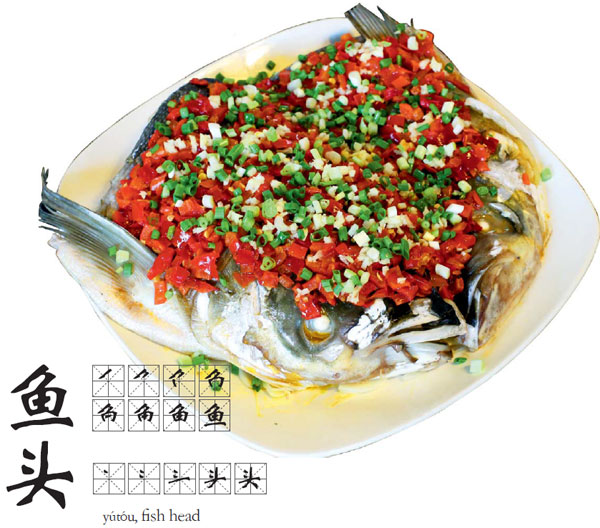The best of Hunan's heavenly heads
The perfect mix of flavors that make a special dish
There is no way to get around it: Chinese people eat heads. Pig heads, chicken heads, duck heads, and even rabbit heads can all be found in Chinese cuisine. One of the more popular head dishes is steamed red pepper fish head (剁椒魚頭 duò jiāo yútóu). In Chinese culinary culture, there is a saying: "Eating meat is inferior to eating fish; eating fish is about eating the cherished fish head (食肉不如食魚,食魚貴食魚頭)". Fish heads are rich in lecithin, a nutrient that helps to improve liver function and lower cholesterol, hence the saying in traditional Chinese medicine: "A fish head is equal to three qian (about 11 grams) of ginseng (一個魚頭三錢參)".
Steamed red pepper fish head has the honor of being part of Hunan cuisine, one of the eight major Chinese cuisines. Hunan food is characterized by its hot and sour flavors, fresh aroma, heavy use of vegetable oil and deep colors. The province's climate tends to be humid, and Hunan people eat their hot peppers to help stave off the damp.

Sichuan cuisine is also well known for its spiciness and heavy seasoning, but Hunan cuisine is more of a dry spice than the numbing burn of Sichuan food. As Hunan is in the middle reaches of the Yangtze River, its various rivers, lakes and pools provide an abundant source of freshwater fish. Big head carp (Hypophthalmichthys nobilis) or 胖頭魚 is often used in this dish. The average length of the big head carp is as long as 60-80 centimeters, and its head is large and scaleless, which makes it an ideal ingredient. But other fish with big heads work as well.
First impressions of steamed red pepper fish head usually touch on its spiciness, but if you give it a second, you will notice that spice does not overwhelm the freshness and aroma of the meat.
According to legend, this dish has its origin with a scholar. In order to avoid the literary inquisition in the reign of Emperor Yongzheng in the Qing Dynasty (1616-1911), the scholar fled to a small village in Hunan and lived with a local family. The family was too poor to buy their guest a proper meal and sent their son to catch some fish.
The hostess then made a large pot of soup with the fish meat, but steamed the fish heads together with chopped red peppers. The scholar was so impressed that he improved on the recipe when he returned home, giving us the delectable dish we have today.
These days some restaurants serve the fish head with some of the body still available. They do this because the head is not fleshy enough for most, but experts will tell you the head is where the focus should be. It is said the meat around the gills is the most delicious part, but according to Chinese table manners, when a whole fish is served, the fish head is always left to the most honored guest. So, when the fish head is served separately, take your chance and dig your chopsticks into the best part, the gratifying gill meat.
Ingredients
1.5 kg fish head 魚頭
100g salted red peppers 剁椒
2 tbsp finely chopped spring onion 小蔥
20g ginger slices 姜
15g leek slices 大蔥
2 cloves of garlic, 1 sliced, 1 finely chopped 大蒜
3 tbsp cooking oil 油
2 tbsp cooking wine 料酒
3 tsp salt 鹽
2 tsp pepper powder 胡椒粉
1. First, make sure the gill is completely removed. Leave the meat around it because that is the best part of the dish. Flip the fish head over and cut it in half at the chin, but keep the skin on the head intact. Unfold the fish head and make it into one large, flat piece. For better seasoning, make several shallow cuts on the meaty area of the fish head.
2. Baste the fish in cooking wine and ensure both sides are covered. Sprinkle salt and pepper powder on the head. Salt it for five minutes.
3. Lay ginger, leeks and garlic slices on a plate as a base and place the fish head on these ingredients. Spread salted red peppers all over the fish head.
4. Put the ingredients in a steamer and steam for eight to 10 minutes.
5. Remove the fish head from the steamer and sprinkle chopped spring onions and garlic over it.
6.Heat cooking oil until a light smoke begins to rise and pour it over the fish head. Serve hot.
Courtesy of The World of Chinese, www.theworldofchinese.com
The World of Chinese
























